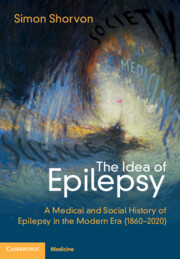Book contents
- The Idea of Epilepsy
- The Idea of Epilepsy
- Copyright page
- Dedication
- Contents
- Preface
- Section 1 The Voyage Of The Good Ship Epilepsy
- Introduction
- Prologue A Note on the Concept – the Idea – of Epilepsy
- Section 2 ‘A Plague upon Your Epileptic Visage’
- Section 3 Epilepsy: The Paradigm of the Suffering of Both Body and Soul in Disease
- Book part
- Glossary
- Bibliography
- Index of Names
- Index
Introduction
from Section 1 - The Voyage Of The Good Ship Epilepsy
Published online by Cambridge University Press: 13 January 2023
- The Idea of Epilepsy
- The Idea of Epilepsy
- Copyright page
- Dedication
- Contents
- Preface
- Section 1 The Voyage Of The Good Ship Epilepsy
- Introduction
- Prologue A Note on the Concept – the Idea – of Epilepsy
- Section 2 ‘A Plague upon Your Epileptic Visage’
- Section 3 Epilepsy: The Paradigm of the Suffering of Both Body and Soul in Disease
- Book part
- Glossary
- Bibliography
- Index of Names
- Index
Summary
The purpose of this book is twofold: first, to describe the history of epilepsy in its modern era, from 1860–2020; second, to explore the reasons for the directions that epilepsy has taken. Epilepsy is much more than a simple medical illness. It has attained a symbolism (an ‘idea’) which has become deeply embedded in the culture of mankind. There have been powerful medical, scientific, societal and personal currents shaping its course, and this book attempts to take a broad perspective on its history, incorporating all four elements. The influence of science is one often overlooked by historians, and yet has played a crucial role. The hegemony of capitalism in the long twentieth century, and the influence of society and culture have equally been often ignored in scientific and medical treatises, and yet have been fundamental in the setting of the epilepsy agenda. The personal story is told through personal testimony and the creative arts which can provide deep insights into attitudes and concerns. Robert Burton’s Anatomy of Melancholy is taken as a model for the approach taken. The complexities and inherent biases of the book are also described.
Information
- Type
- Chapter
- Information
- The Idea of EpilepsyA Medical and Social History of Epilepsy in the Modern Era (1860–2020), pp. 3 - 15Publisher: Cambridge University PressPrint publication year: 2023
